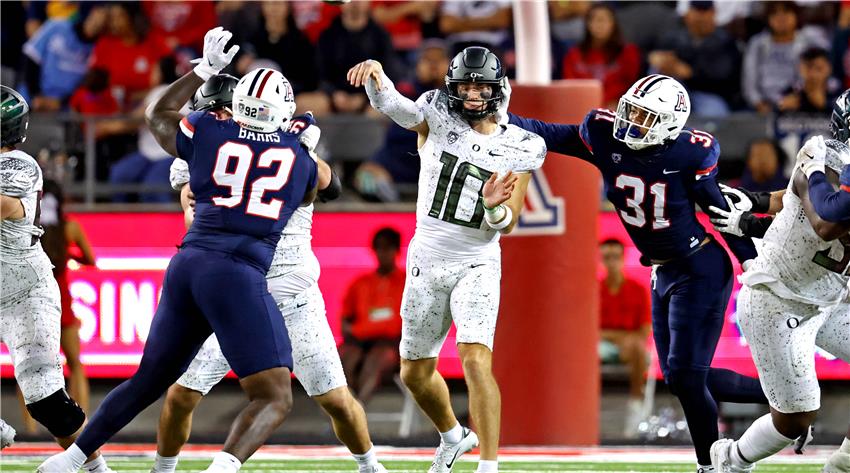
Draft-Day Live Betting- How Offshore Books Beat the Clock
Every year, the NFL Draft becomes a spectacle of anticipation, guesswork, and last-minute decisions that can change the trajectory of franchises. While analysts talk trades and GMs pace war rooms, another game plays out in real-time.
A game that’s less about the potential of individual players and more about reaction speed. Welcome to the world of draft-day live betting. Here, timing is everything, and the smartest bettors often aren't watching ESPN. They're glued to Twitter feeds, Reddit leaks, and offshore sportsbooks that seem to move faster than Vegas can.
In theory, betting on who gets drafted where should be a fair fight. Oddsmakers publish lines, bettors make picks, and the market responds to sharp action or new information. The reality is different. The draft isn’t a live sporting event governed by clockwork. It’s a TV broadcast of decisions that have already been made behind the scenes. Information travels fast on draft day, and it travels unfairly. This is where the speed gap opens up, and it's offshore books that consistently stay one step ahead.
Domestic operators are typically heavily regulated and are tied to slower-moving risk management processes. Sportsbooks based overseas, on the other hand, have built reputations on agility. These sites can change odds on the fly, react to rumors within seconds, and offer live bets deep into the draft without worrying about compliance bottlenecks. Some of the better-known overseas options feature live props during events like the NFL Draft, as well as crypto payment options, no KYC checks, and a wide variety of bet types. Many of these sites have more flexible wagering limits, allowing them to be faster, riskier, and often more appealing to bettors chasing real-time intel.
The advantage isn't just about speed, though. It’s about who these bookies are listening to. U.S. sportsbooks often use internal traders or major line providers that adjust odds across all their clients to protect against financial risk. That can slow everything down. Offshore books, on the other hand, have less red tape and are often plugged into smaller, more nimble networks of insiders, journalists, and social media sleuths. In some cases, it only takes one beat reporter leaking a pick early for odds to vanish or shift dramatically. A sharp bettor tracking the right accounts can jump in before a domestic book even notices the move.
This wasn’t always the case. In earlier draft cycles, most betting was static, with outright wagers placed days or weeks in advance, usually on the top five or ten picks. Now, live betting options run deep into the second and third rounds. Prop markets include head-to-head matchups, positional totals, over/under pick numbers, and even whether a player will appear in a certain highlight package before being called. Every micro-moment becomes bettable, but only if you can catch it before the line jumps or disappears.
The 2023 draft provided a case study in just how sharp the timing needs to be. Will Levis, initially expected to be a top-five pick, saw his odds tank in real time as credible leaks suggested teams were passing. Offshore books were quicker to react than their U.S. counterparts. Some punters managed to grab long odds on other quarterbacks moving up the board while the major U.S. books still had outdated lines posted. The difference in payout potential was enormous, and it all hinged on a matter of minutes, sometimes seconds.
This kind of volatility creates a cat-and-mouse game between bettors and bookmakers. Offshore books accept that they’ll take hits on some fast-moving bets in exchange for higher total volume. It’s a calculated risk. They know that for every bettor with a Twitter scoop, there are dozens more chasing shadows. For experienced gamblers, learning which sources to trust, spotting patterns in the odds movement, and acting without hesitation is part of the thrill.
That edge gets sharper with each draft. Even NFL insiders have started commenting on how fast betting markets reflect information they thought hadn’t yet gone public. In some cases, sportsbooks have even pulled lines entirely after realizing bettors were reacting to leaks before the networks were. It’s a quiet war for information supremacy, and it’s not always clear who’s winning.
Some bettors try to automate their edge using bots or scripts that scan social media for early picks, but these tools are often blocked or limited on U.S.-licensed platforms. Offshore sportsbooks don’t really have those restrictions, and sometimes tolerate or even encourage this kind of high-frequency activity. That makes them ideal for those who are betting more like day traders, by reading signals, placing short-term wagers, and cashing out fast.
Of course, there is a cost. Offshore books don’t offer the same guarantees as licensed U.S. platforms. There’s less protection against disputes, slower resolution processes, and limited recourse if a site decides to void a bet. It’s the price of playing in a faster, looser market. For casual fans, it might be safer to stick with legal books, but for those who live for draft day drama and trust their timing? The offshore market remains a serious draw.
There’s also a shift in how bettors think about information. Watching the draft is one thing. Betting it in real-time is another. You’re not just reacting to picks. You’re reacting to reactions. If Adam Schefter tweets, markets move. If a team’s war room cam shows someone on the phone, savvy bettors know that means a trade could be incoming. Even the way a player dresses or which family members show up in the green room can spark speculation. Offshore sportsbooks know this and price risk accordingly. They often bake volatility into their models rather than suppressing it.
That openness to chaos is what gives offshore platforms their edge. They’re built to handle noise, to let the market breathe, and to absorb sharp action without panicking. In contrast, U.S. books often overreact to action, pulling markets or slashing limits rather than adjusting lines naturally. That’s not a knock on their risk teams. It’s just a reflection of a business model that favors stability over speed.
Live betting on the NFL Draft may never match the handle of a Sunday afternoon slate, but its growth is impossible to ignore. It represents a new kind of sportsbook behavior that’s reactive, flexible, and deeply online. Offshore books have adapted quickly to that shift, making themselves the go-to for those chasing real-time value. As the draft becomes even more of a media event, the demand for fast, fluid betting will only increase.
In the end, the NFL Draft is about futures. Not just the futures of players or teams, but also the future of betting itself. Who’s first off the board matters, but so does who gets the best number. Offshore sportsbooks aren’t waiting for permission. They’re already betting that the clock doesn’t matter when you’re ahead of it.
